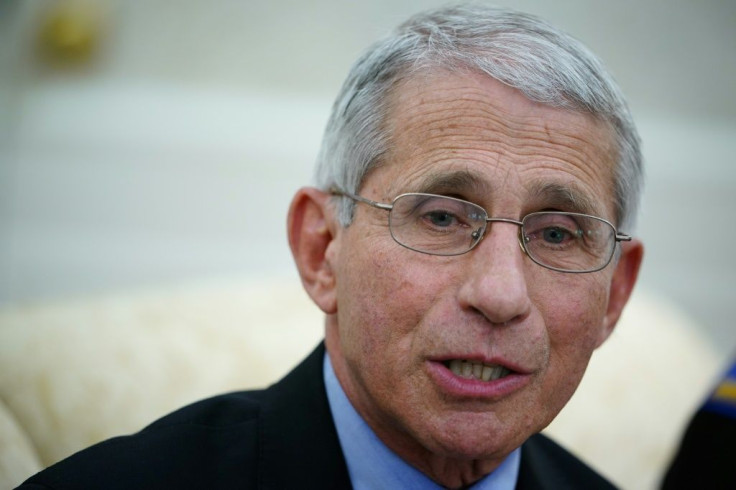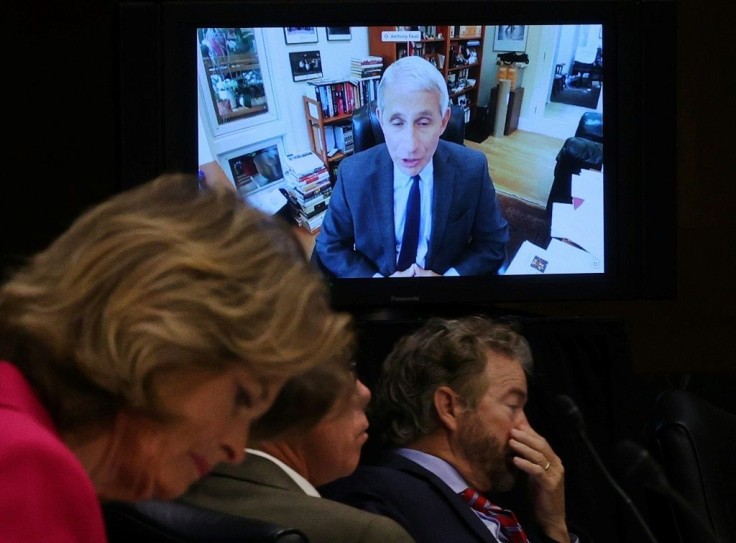At Odds With Trump, Top Expert Says Dangerous To Reopen Too Fast
The US government's top infectious disease expert warned Congress Tuesday that ending lockdowns too quickly could bring "really serious" consequences including new outbreaks of coronavirus just as the country tries to overcome the pandemic.
In his first appearance on Capitol Hill in two months, Anthony Fauci delivered a message of caution that was at odds with the rhetoric of President Donald Trump, who has pressed for rapid steps to rekindle the devastated economy.
The respected scientist told a Senate panel federal authorities had developed guidelines on how to safely reopen activities, and a sustained 14-day decrease in cases was a vital first step.
"If a community or a state or region doesn't go by those guidelines and reopens... the consequences could be really serious," said Fauci.
"There is a real risk that you will trigger an outbreak that you may not be able to control," he later added, warning that would not only cost lives, "but could even set you back on the road to trying to get economic recovery."
In response to a question by Senator Bernie Sanders, Fauci acknowledged that US coronavirus deaths are likely higher than the roughly 80,000 fatalities in the current official government toll.

This, he said, was because many people particularly in hardest-hit New York died at home before they could be admitted to a hospital.
Some colleges meanwhile have begun to announce plans to restart classes in fall, but Fauci argued that the idea vaccines or treatments might be ready in time to assuage student fears was a "bridge too far."
The antiviral remdesivir was recently shown in a clinical trial to speed up the time COVID-19 patients take to recover, but Fauci said the results were "modest" and concerned hospitalized patients, and the treatment closest to wide use by that time might be the blood plasma from recovered patients.
He added he was "cautiously optimistic" about the prospects of a vaccine, with eight candidates undergoing clinical trials, including one made by the firm Moderna which is closely collaborating with the National Institutes of Health where Fauci is a senior official. An answer to whether it works could come by late fall or early winter, he said.
"We have many candidates and hope to have multiple winners," Fauci said. "In other words, it's multiple shots on goal."

Fauci, who has become the trusted face of the federal government's virus response, was one of four top medical experts testifying remotely to the Senate Health, Education, Labor and Pensions Committee.
The director of the National Institute of Allergy and Infectious Diseases, Fauci himself is in "modified quarantine" after Vice President Mike Pence's spokeswoman -- who he had no close contact with -- tested positive.
There has been frequent speculation that Fauci's forthright approach has irked President Trump, who has been accused of downplaying the dangers of the crisis as he pushes to restart the economy.
Fauci appeared in Congress hours after Trump renewed that message on Twitter, writing: "Numbers are coming down in most parts of our Country, which wants to open and get going again. It is happening, safely!"
The US has reported more than 80,000 deaths and 1.3 million infections.
While the situation has improved in New York and the daily nationwide death toll has dipped markedly in recent days, the rate of new cases has yet to drop off dramatically.
Tuesday's hearing was Fauci's first congressional appearance since Trump declared the coronavirus pandemic a national emergency on March 13, and it was reported that the scientist was barred from testifying at an earlier House hearing.
Though widely respected by lawmakers in both major parties, Fauci came under fire from Republican Rand Paul, who said that because the mortality rate in children is low, schools could be reopened in certain districts faster.
"As much as I respect you Dr. Fauci, I don't think you're the end all," said Paul. "I don't think you're the one person who gets to make the decision."
Fauci responded that he only offered scientific advice, but warned not to be "cavalier in thinking that children are completely immune to the deleterious effects" of COVID-19, given growing reports of children suffering from a related autoimmune syndrome.
The White House has outlined a three-phase approach to help state and local officials reopen their economies, while observing medical advice on limiting the virus' spread.
As well as a two-week "downward trajectory" of cases, it calls for robust testing for at-risk healthcare workers, with asymptomatic cases screened as well, and contacts of positive cases traced.
Trump himself has been criticized however for leaving states to grapple alone with their outbreaks and even bid against each other to obtain critical medical equipment.
© Copyright AFP 2024. All rights reserved.











